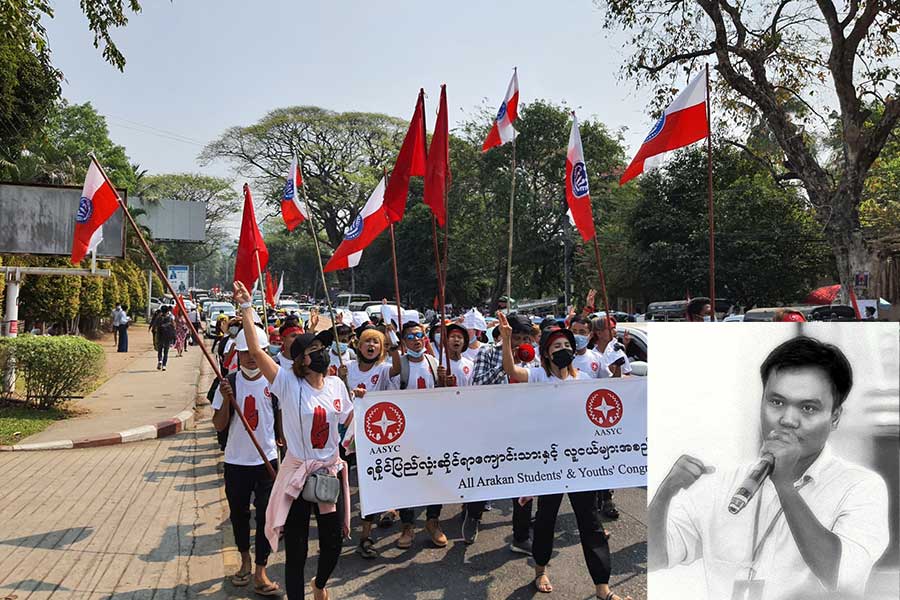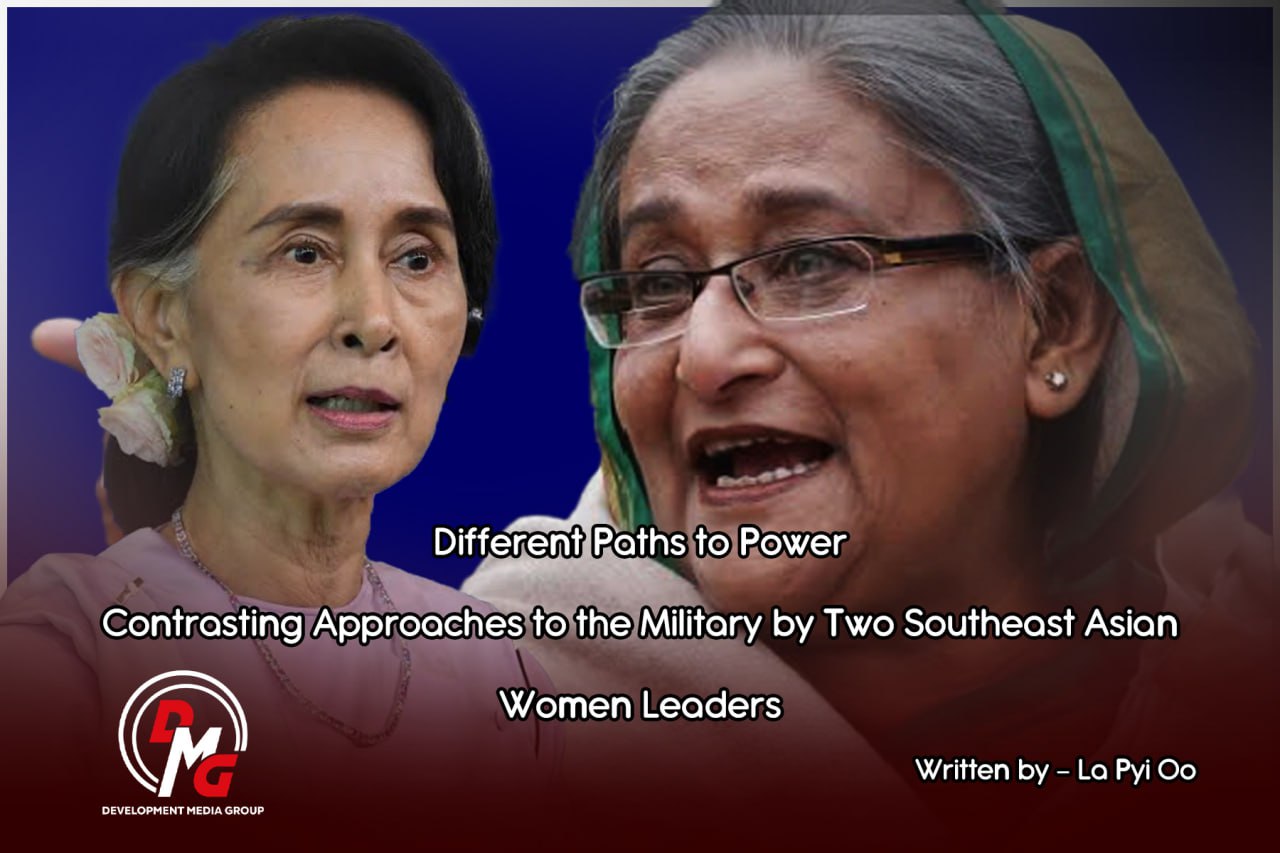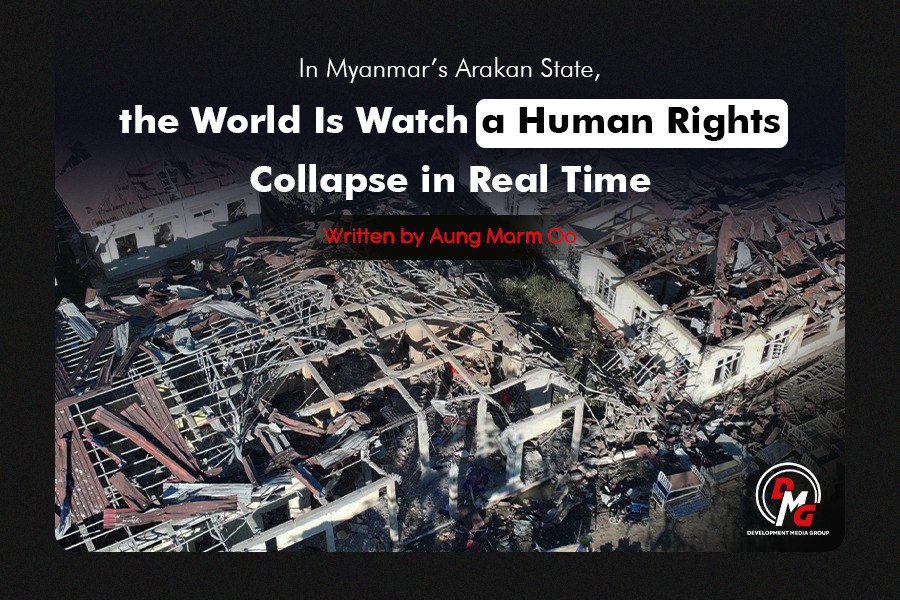- Residents in AA-held areas face new restrictions on travel outside Arakan State
- Natural fertilizer gains popularity among farmers in Arakan State
- Cut Off and in the Dark: How Communications Blackouts Are Deepening Human Suffering in Arakan
- ULA Health Department urges pharmacy owners to apply for drug sale, import licences
- Betel leaf cultivation booms in Arakan State amid rising prices
AASYC leader: ‘We will continue to fight politically, using non-violent tactics without taking up arms’
In recognition of the recent anniversary of the AASYC’s founding, DMG interviewed its chairman Ko Saw Tun, discussing the history of the AASYC, its current activities, and its views on the political situation in Arakan State.
09 Oct 2023

DMG Newsroom
9 October 2023, Sittwe
The All Arakan Students’ & Youths’ Congress (AASYC), which was established in Bangkok on October 6, 1995, celebrated its 28th anniversary last week.
The AASYC is an organisation active in Arakan State’s democracy and human rights movements, as well as in opposition to the ruling military dictatorship.
In recognition of the recent anniversary of the AASYC’s founding, DMG interviewed its chairman Ko Saw Tun, discussing the history of the AASYC, its current activities, and its views on the political situation in Arakan State.
DMG: Please tell us about the AASYC’s current activities in Arakan State.
Ko Saw Tun: We document human rights violations in Arakan State and conduct awareness campaigns and education about human rights. We are connecting with allies and doing environmental campaigns and advocating for indigenous peoples. We collect records on human rights and continuously report the human rights violations in Arakan State to the international community.
As we cannot accept the military coup, we are working against the military coup. We are working against the junta’s [planned] sham election as much as we can. The AASYC brings together all Arakan political parties, EAOs [ethnic armed organisations], CSOs [civil society organisations] and individuals, and participates significantly in the Arakan Ethnic Affairs Policy Committee. We have provided technical support and been deeply involved since 2018.
DMG: Does the AASYC collaborate with other student organisations?
Ko Saw Tun: We do collaborate with other students’ organisations. Since the AASYC’s inception, it has been making alliances with youth in border areas wherever possible. We are working together with the Students and Youth Congress of Burma (SYCB) on human rights, democracy, nation-building, anti-dictatorship and the opportunity to create our own destiny.
DMG: Tell us about the situation you encountered during the AASYC’s political transition.
Ko Saw Tun: Since the formation of the AASYC, we have faced many difficulties and challenges due to the prevailing political situation. After the fighting in Arakan State, we had to work more and it was a very difficult situation. On the ground, we are subjected to challenges, threats and dangerous actions between the military and the Arakan Army (AA). As for the military junta, they are intensifying their oppression of us, an opposition group.
DMG: We know that AASYC members have been arrested for their political activities. Tell me about that.
Ko Saw Tun: From the time the AASYC was formed until today, about 20 members have been arrested. The forms of detention are different. Some face detention in foreign countries. Some were arrested by the military junta in Myanmar. Another thing that is noteworthy is that during this period of political tension between our ethnic groups, the Arakan resistance forces arrested our members.
DMG: How does the AASYC move forward in the current political situation?
Ko Saw Tun: According to the current public needs, we have to continue to hold the role of students. We will continue to carry the Arakan national flag carried by the leaders of all ages who have entered the fight since the fall of Arakan State. We will continue to hold the flag of democracy and human rights. Mainly, we are going to continue to fight politically, using non-violent tactics without taking up arms. If necessary, we will continue to fight political battles on the ground.
DMG: Does the AASYC cooperate with Arakanese armed organisations?
Ko Saw Tun: In principle, we are related to the Arakanese armed groups. Frankly speaking, we have cooperation with the Arakan National Council (ANC). In terms of how they do things, they have more or less cooperation with us in terms of their public affairs and politics.
We have no cooperation with other Arakan armed groups such as United League of Arakan (ULA) or Arakan Liberation Party (ALP). The ALP has been very difficult to deal with since the signing of the Nationwide Ceasefire Agreement (NCA). The ULA/AA voices saying that there should be no other groups in Arakan State except for them make it difficult for us to work together. According to the principles of our organisation, we are always willing to cooperate with any armed forces that have the same goal, that being the liberation of Arakan State.
DMG: How do you view the relationships among the Arakanese armed groups such as ULA/AA, ANC/AA and ALP?
Ko Saw Tun: From our point of view, around 2016, the ALP and the ANC discussed coordinating. The process was halted due to the unclear position of representation between the ALP central committee and central headquarters. And we heard that at the 2014 Kyaukphyu conference there was agreement between the ALP and the ULA to coordinate. But after the discussions, nothing materialised.
After the start of the fighting [between the Myanmar military and Arakan Army] in 2015, we saw each go from partners to adversaries. The ANC side said that political cooperation needed to be done step by step. There is not much cooperation among these organisations. From what the ULA has heard, there is widespread sentiment that when armies merge with each other, the weaker faction dissolves their respective factions and merges with the more powerful faction.
In this case, there has not yet become a form of political integration and negotiation, so we still need time to form a unified structure among ourselves. I see that there are many steps to go.
DMG: What are your thoughts on the Arakanese political parties cooperating with the military regime?
Ko Saw Tun: During the 2010 general election, we supported political parties for Arakan nationalism. If political leaders in Arakan State need us for work or meetings, we will accompany them as needed. There are things we have done for the leaders of the Arakan political parties in terms of security, travel, et cetera.
In the 2010 election, when the political parties were formed, although we did not accept the 2008 Constitution, there was support for their efforts to participate in politics. It is sad to see that some political parties that we had cooperation with before are now cooperating with our enemy, the military regime. This is their position, so we don’t want to say too much, but we don’t need to worry.
DMG: What would you like to say about the current political landscape in Arakan State?
Ko Saw Tun: The political situation in Arakan State is sad and hopeless. I see that the revolutionary forces in Arakan State cannot make good use of the current situation in Myanmar’s politics. Though the Myanmar military has been in a state of decay since the beginning, it has gotten much worse since the coup. Even Burmese people and pro-military groups are armed and rebelling against the Myanmar military.
On the other hand, some Arakanese political parties are finding their cooperation with the enemy army [Myanmar military] to be disappointing. They need to reconsider to what extent their being in the administration of the military council has been fruitful. If they don’t do this, they will only fall further.




.jpg)















